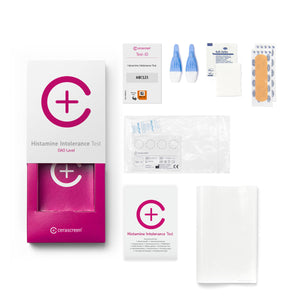product_id = 6659994550331variant_id = template_name =

Cat Allergy Test
About the test
The cerascreen® Cat Allergy Test determines the number of cat-hair-specific IgE antibodies in your blood. This tells you whether you are sensitised to cat dander and therefore possibly allergic.
Cats are the most common culprits of animal allergies. The symptoms of a cat hair allergy are irritating to deal with in everyday life – you might experience skin complaints such as itching and redness, respiratory problems such as coughing and an increased risk of asthma.
Cat Allergy Test
- Take your sample at home – conveniently and discreetly
- Have the amount of immunoglobulin (IgE) antibodies in your blood determined
- Receive a state-of-the-art laboratory analysis
- Receive the result within a few days after your sample’s arrival at the laboratory
- Benefit from specific recommendations to reduce cat hair allergy symptoms
Benefits of the Cat Allergy Test
No pet is more popular than a cat. And those who are allergic to cats, unfortunately, react to hair of all breeds. Whether you already have cat allergy symptoms, or you are thinking of becoming the proud owner of a furry feline pet, it is so important to know your own allergies.
With the cerascreen® Cat Allergy Test, you benefit from a professional laboratory analysis, which is performed in our laboratories the same way it is performed in doctors’ surgeries when it comes to allergy tests. But without waiting time at the doctor's office and with the freedom to take your sample whenever you want, discreetly and comfortably at home. Benefit from our expertise: cerascreen® is the market leader for medical sampling and submission kits in Europe, with eight years of experience in test development and analysis. We have developed more than 50 approved send-in test kits (medical devices), evaluated 250,000 samples and serve 19 countries.
Result of the Cat Allergy Test
We will inform you by email as soon as your Cat Allergy Test sample has been analysed. You will receive your individual results report via the My cerascreen app or by logging in to your account on our website. View the report on your smartphone, tablet or computer, or simply print it out.
The laboratory analysis can determine whether and to what extent your immune system is sensitised to cat dander. Learn how to reduce the discomfort of cat hair allergy symptoms in everyday life with our concrete recommendations for action.
Frequently asked questions about Cat Allergy Test
Why test for cat allergy?
Cats are the most commonly kept pets. These four-legged friends live together with humans in many households all over the world – and they regularly trigger pet hair allergy symptoms.
If you are interested in getting a cat, it is worthwhile checking beforehand whether you are allergic to cat hair. Even if you already live with a cat, allergies can reemerge. It makes sense to get to the bottom of any allergy symptoms so that you can do something about them. Untreated pet hair allergies that continue to trigger symptoms can increase the risk of allergic asthma.
How does the Cat Allergy Test work?
To do the cat hair allergy test, take a few drops of blood from your fingertip with a lancet. You then send the sample on the dried blood spot card provided via a return envelope to our partner medical laboratory.
The laboratory will analyse your blood to see how high the number of IgE antibodies for feline epithelium is. Epithelia are cells in the upper layer of the skin that contain cat allergens.
Please note that the most meaningful results will only be obtained if you have had contact with the allergen in the two weeks or so prior to sampling. Some medications, for example antihistamines, can also influence the result.
What do the allergy test results tell you?
The results indicate whether you are sensitised to cat dander and to what degree. Sensitisation is when your immune system overreacts when it encounters an allergen such as cat hair epithelium..
This does not automatically mean that you have an allergy. However, if you have additional symptoms when you are in a room with these animals, you probably have a cat hair allergy
How long does the analysis take in the laboratory?
Once your sample has arrived at the laboratory, it will be analyzed there by specialists. How long the analysis takes depends on the exact measuring method and the processes in the laboratory.
If the sample is sent on the correct days (Sunday to Tuesday), this makes it easier for the laboratory to adhere to the times.
For the Cat Allergy Test, the laboratory analysis is usually completed within 5 working days after the sample is received in the laboratory.
What recommendations do you receive after the Cat Allergy Test?
If you are allergic to cat dander, you are likely to have a similar reaction to all cats – there are no specific breeds or individual animals that trigger fewer allergy symptoms, as there are with dogs.
The results report will give you more advice on how to deal with a cat hair allergy. For example, if you suffer from allergies, your first priority should be to avoid cat hair in your bedroom.
What happens when you have a cat allergy?
With an allergy, your immune system reacts to substances that are actually harmless that enter your body. This immune reaction then leads to typical allergy symptoms, such as sniffling, an itchy throat and skin rashes.
In the case of cat hair allergy, the substance responsible is cat’s epithelium – these are cells in the top layer of a cat’s skin. These allergens spread very quickly when cat hair is dispersed in the air and also on clothing.
How can you diagnose a cat allergy?
Cat hair allergy is considered an respiratory allergy. It therefore mainly affects the respiratory tract. As a rule, reactions are immediate. You will experience symptoms shortly after inhaling cat hair or getting it on your skin.
Typical symptoms of cat hair allergy are:
- Cow’s milk and eggs
- sneezing, runny nose and itchy throat
- red, itchy and watery eyes
- Wheat
- swelling and redness of the skin
In the long term, an allergy to cat dander can develop into allergic asthma. The risk increases if you often feel unwell because of cat allergens.
How do you treat a cat allergy?
Antihistamine tablets can suppress allergic reactions. But you should only use them for a short time. These medicines are therefore only a solution to take occassionally when you spend time around cats.
Cat hair allergy can only be treated by hyposensitisation (specific immunotherapy). Doctors administer the allergen several times over a period of two to three years. Immunotherapy is not always successful. If successful, your immune system gets used to cat hair. The animal hair then causes very few, if any, allergic symptoms.
For whom is the Cat Allergy Test not appropriate?
The blood test is not or only partially suitable for certain groups of people:
- People with infectious diseases such as hepatitis and HIV should not perform the blood test.
- Pregnant and breastfeeding women should only perform the Cat Allergy Test under medical supervision. Reference values and recommendations do not apply. You should therefore obtain recommendations on the test result from your doctor.
- The test is not suitable for children under the age of 18.
It is not intended to diagnose illness. If, for example, you suffer from severe pain, consult a doctor.
Why are children under 18 not allowed to take the test?
Our tests are not suitable for underage children and adolescents under the age of 18. Under 18s cannot activate the tests online and therefore cannot receive a test result. We ask that you do not administer the tests to your children either.
Children and adolescents need much closer supervision and counselling regarding medical tests and their interpretation. Testing with lancets and chemicals is not without risk and would need to be closely supervised by guardians. In addition, the reference values we give are always based on adult data. In the case of children, the risk of misinterpreting the results would be very high.
We want to fulfil our responsibility as a provider of medical products and ensure that children and adolescents are not unsettled by measurement results that are difficult for them to interpret. Since we cannot control whether the minors' legal guardians actually consent to the test being carried out and supervise them, we exclude tests for under 18s altogether.
If you are under 18 and have purchased a test, please contact our customer support.
Why does it take up to a week for the sample to reach the lab?
Please bear in mind that your results will not be analyzed in the UK but in Germany. For that reason, it can take up to a week for the sample to arrive at the lab. This does not affect the stability of the samples, as the method we are using is optimized for long transports.
Initially, your sample is sent to our collection center in the UK. From there, it is shipped to our central sample sorting facility in Germany, which then distributes samples to our partner laboratories. Once your sample is analyzed there, you will receive a notification and can access your result online.
Please check your mailbox regularly. We will notify you as soon as your sample is sent, arrives, or is analyzed.
Why does the test have an expiration date?
The cerascreen® test kits are CE-marked medical devices, which in turn include other certified medical components such as lancets, patches, and alcohol swabs used in blood tests.
Like most medical devices, these components have an expiration date to ensure that they remain safe and effective. Many of our sample carriers – such as dried blood cards or sample tubes – are chemically treated to keep your sample stable and analyzable in our laboratory. Over time, environmental factors can affect this treatment and compromise accuracy.
Our sterile, single-use lancets also carry an expiration date to guarantee sterility and safe use up to that time.
This is how it works
1. Test at home
Your test kit contains everything you need to draw a small sample of blood from your fingertip. Then send the sample back to us free of charge in the enclosed return envelope.
2. View results online
After the evaluation in the medical specialist laboratory, you will have online access to your personal result report.
3. Act
Your access to the test results and the evidence-based findings and tips to improve your health: the my cerascreen® user profile on our website or our app.

















